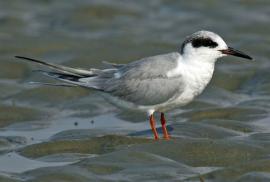Guide to Boreal Birds
Overview
One of the few exclusively North American terns, Forster's is so similar to the Common Tern that it was not recognized as a distinct species until 1831. Its preference for marshes enables it to avoid competition with the Common Tern, which favors sandy or pebbly beaches and rocky islands. It was named after Johann Reinhold Forster (1729-1798), a German pastor-naturalist who accompanied Captain Cook around the world in 1772.
Description
14-15" (36-38 cm). White with pale gray back and wings, black cap, and deeply forked tail. Bill orange with black tip. Similar to Common Tern, but wing tips frosty white, bill more orange. In winter, lacks black cap but has distinctive black mark behind eye.
Voice
Harsh nasal beep.
Nesting
3 or 4 buff, spotted eggs on a large platform of dead grass lined with finer grasses, usually placed on masses of dead marsh vegetation. Nests in colonies.
Habitat
Freshwater marshes in West; salt marshes in East.
Range/Migration
Breeds along Atlantic Coast from Massachusetts to Texas and in interior from Alberta and California east to Great Lakes. Winters along coasts from California and Virginia southward.



